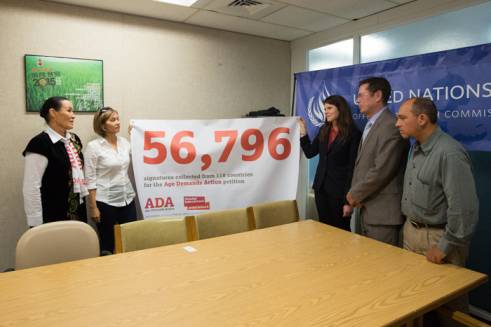By Bridget Sleap and Navdha Malhotra

The third session of the UN Open-ended Working Group on Ageing (OEWG) ended positively on 24 August 2012, with a strong recommendation to continue and renew the Working Group’s mandate.
The session took place in New York from 21-24 August. Regular sessions provide a unique opportunity for UN Member States to look at how existing human rights mechanisms protect older people’s rights. If found to be inadequate, the group can then explore the creation of new mechanisms.
OEWG mandate to continue
There was a fear going into the third session of the OEWG that the lack of participation and consensus among Member States might result in the closing down of the OEWG process at worst, or, dilution of its mandate at best.
However, it is now more likely that Member States will continue the present mandate of the OEWG and that there will be a fourth session in 2013. This will be agreed in the annual UN General Assembly resolution on ageing, to be negotiated in September-October 2012 in the General Assembly Third Committee.
Age Demands Action petition handover
HelpAge also took the opportunity at the OEWG to present our Age Demands Action petition to Ivan Simonovic, the UN Assistant Secretary-general for Human Rights.
The petition signed by over 56, 000 people across the world calls for a UN convention on older people’s rights. It was handed over by Kulumkan Shabdanbekova, ADA activist and older woman from Kyrgyzstan.
Ms Shabdanbekova also talked about the Age Demands Action campaign and the contributions older people make to society. She stated that the OEWG should continue the discussions towards a convention protecting older people’s rights.
Ivan Simonovic graciously accepted the petition and recognised that older people’s rights are an important issue that needs to be considered at the UN level. He also expressed him commitment to support new mechanisms to protect older people’s rights.
Inequalities in laws to protect older people’s rights
Whilst there was still no consensus between Member States about the need for a new convention on the rights of older people, there was a perceived shift in the discussion at this third session.
Increased participation of African and Asian Member States helped to fracture the very polarised discussions of the previous meetings that had been dominated by European and Latin American Member States. It now feels as if the political impasse can be overcome.
The more global discussion also highlighted the vast inequalities and disparities in the laws, policies and programmes that protect older people’s rights across different regions.
This patchwork of protection available to older people reflected the same fragmentation of standards throughout the international human rights framework. It also underscored the argument for a comprehensive human rights instrument to protect older people’s rights.
Continued pressure from civil society is vital
Member State participation, though improved, was still disappointingly low. Only about 35% of the 193 Member States attended. Participation, particularly in the discussions on different areas of older people’s rights, was still dominated by European and Latin American Member States.
Much more needs to be done between now and the next OEWG to build on the growing support, especially from African and Asian Member States.
The inequality in mechanisms to protect older people’s rights is unacceptable and undermines the universality of human rights. Continued support, pressure and demand from civil society at the national level are critical.
Support older people’s rights by signing our Age Demands Action petition.
Read more about HelpAge at the OEWG.
